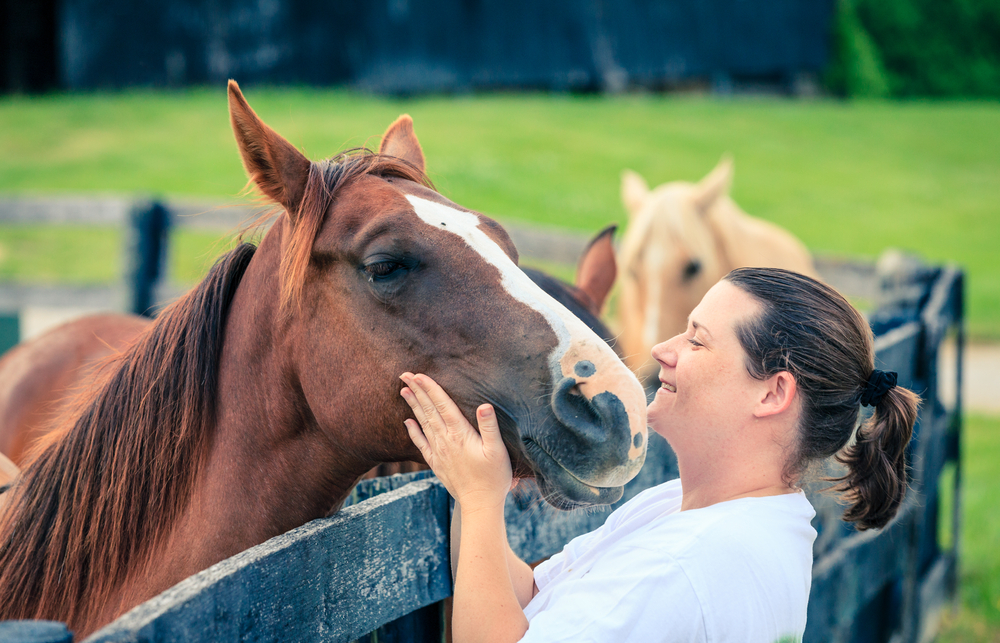Military service is one of the most selfless acts a person can undertake. Grueling hours, dangerous missions, and intense physical demands make it a particularly difficult career. Unfortunately, serving also often leads to psychological trauma. There are many approaches to treating these issues, but equine therapy for Post Traumatic Stress Disorder (PTSD) is often overlooked.
Considering how effective the treatment has proven to be for military service members, this is a tragic fact. Research has repeatedly shown animal-assisted therapy efficacy, particularly those involving human interaction with horses. Clients who visit Transformations Mending Fences have access to this and many other therapies because the appropriate treatment is the one that works.
Contact Transformations Mending Fences today to learn more about equine assisted therapy and our other treatment for veterans suffering from physical and emotional challenges.

Understanding the specifics of how equine therapy helps treat post traumatic stress disorder of combat veterans, law enforcement officers, wounded warriors, marine corps veterans and other first responders is important. Even more important, though, is understanding the benefits. This will help you decide if equine-assisted psychotherapy is the right treatment for you. If you’re a veteran dealing with PTSD — like up to 20% of recent service members, there’s a good chance you can benefit. Here’s why:
Overcoming posttraumatic stress disorder involves identifying and processing trauma. During this process, though, there’s no reason treatment can’t target symptoms. Mental health professionals use equine therapy because it treats many related symptoms. Here are just a few issues that improve with this approach:
These stem from the symptom clusters discussed more in-depth in the next section, necessary for a post traumatic growth diagnosis. These clusters include avoidance and numbing, re-experiencing the trauma, and hyperarousal. Effective treatment becomes possible by using equine therapy to combat these clusters.
Many different animal-assisted therapies have proven successful in residential mental health treatment. Of all the animals used in this type of therapy, horses are the most beneficial for vets. This is because all horses and veterans share many common traits. This helps them understand each other and create unspoken communication through the healing process.
Just consider a few of the common traits between therapy horses and a military veteran:
These are necessary traits for the survival of both horses and military members. This is what makes equine therapy for PTSD so promising for our program participants. If you served in the Armed Forces and find it difficult to level with others, equine-assisted psychotherapy is a good place to start. Trusting others comes easier when you build trust with such a massive and majestic being.
Many military veterans have sought treatment for PTSD and its related issues, and they sometimes find themselves relapsing afterward. This is because certain therapy doesn’t create long-lasting effects. This is often why continuing treatment is necessary to curb the symptoms of posttraumatic stress disorder.
Fortunately, this seems like less of an issue when using equine assisted activities for military veterans. That’s because brain imaging scans have shown physical neural changes following treatment. This means it’s not just about an improved mental state — there are structural and functional changes in the brain. This can lead to long-lasting effects and even help to improve traumatic brain injury. in some cases.

Coping with trauma can be a difficult endeavor. Veterans using equine therapy programs for PTSD treatment often have an easier journey, but it’s understandable if you initially have reservations. After all, how can playing with a horse help overcome serious trauma? To start, this therapeutic process doesn’t involve playing with therapy horses. It may sometimes feel like that, but there is a purpose.
A person’s interactions with a horse accomplish various goals. First, people will often see their emotions mirrored in the horses they’re working with. Equines are very responsive creatures, so this helps clients become more self-aware and mindful of their feelings. Equine therapy for veterans also accomplishes the following treatment necessities:
Equine therapy has shown great promise, but it remains relatively new compared to approaches like Cognitive Behavioral Therapy. Because of this, the exact mechanisms of effectiveness are still somewhat of a mystery. It’s likely that the equine therapy program works in various ways — both mentally and physically — to improve outcomes of posttraumatic stress disorder.
The underlying mechanisms of equine therapy may seem complex, but the most important thing to remember is that it works. Studies have shown positive outcomes in as little as three weeks of treatment. There’s no way to predict how long your treatment plan may need to be, but simply reaching out to a mental health facility in Florida is the first step in answering this question.
Contact us at Transformations Mending Fences today to get started on the path to wellness.
When you visit a mental health facility, you’ll hear the term “treatment plan.” While this could refer to a single therapy, it often involves several approaches personalized by mental health professionals to help you recover. There aren’t any “magic fixes” for mental health issues. PTSD must be approached from all sides, and all related factors (e.g., co-occurring disorders, underlying conditions) must be considered.
One of the most important considerations for equine assisted therapies — and why complementary approaches may be necessary — is symptom clusters. There are three distinct symptom clusters of posttraumatic stress disorder, and depending on your situation, alternative therapies may be better suited for treatment. That’s why Transformations Mending Fences also offers the following approaches:
While this list may seem extensive and far from exhaustive, equine assisted therapy has proven invaluable for treating veterans, but no approach must go overlooked. Depending on your unique situation, your treatment plan could look very different. Even from someone you served with, it is vital to offer a variety of mental health treatments.
You’ve been living with PTSD. You may feel like your situation is hopeless. With so many proven approaches available, there’s certainly a treatment plan that can help you gain a sense of normalcy.

Serving in the military increases the risk of posttraumatic stress disorder and other conditions, but this isn’t a reality you have to continue living with. We understand PTSD more every day, and everything we learn gives us additional tools to overcome mental illness. The benefits of equine therapy are many, but the first step is simply reaching out for help.
Transformations Mending Fences has a staff of certified professionals committed to helping our heroes. While equine-focused therapy may be exactly what’s needed, you and our licensed therapists will develop the treatment plan that best works for you. Contact us today to learn more about our equine therapy for veterans program and other mental health services we offer.
Department of Veterans Affairs
https://www.ptsd.va.gov/understand/common/common_veterans.asp
HHS Author Manuscripts
https://www.ncbi.nlm.nih.gov/pmc/articles/PMC2756737/
Human Brain Mapping
https://pubmed.ncbi.nlm.nih.gov/33547694/
Military Medical Research